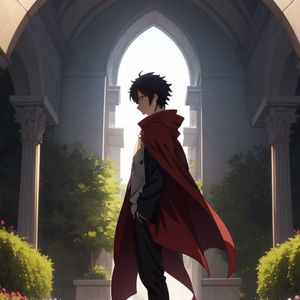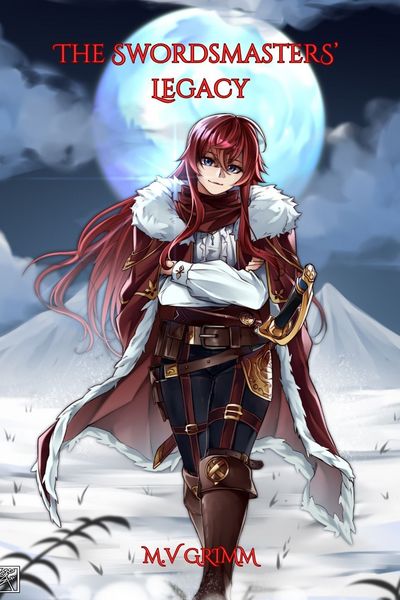The weeks after I arrived at Heincraft were filled with nonstop events and learning experiences. My existence seemed crammed into an overflowing schedule, leaving barely any time to catch my breath. Every day was a balanced theory with practice. One class, we were out in the training fields, sweating through swordsmanship drills. In the next, we’d be hunched over books or enduring long lectures on everything from ancient magic to the political landscape. It felt like juggling firebrands while balancing on a tightrope. It wasn’t easy, but then again, if it was, would it be worth it?
I threw myself into mastering swordsmanship, knowing it was the key to everything. The biggest challenge was learning to manifest the Aura blade, a technique every student at Heincraft was expected to master by graduation. It was easy to say, but impossible to do. The Aura blade was like trying to grab a shadow, a blade of spiritual energy that came to life only when your focus, skill, and inner strength aligned perfectly.
The problem was, no matter how much I concentrated, it always slipped through my fingers. And I wasn’t the only one struggling. My classmates, whether intermediate swordfighters or beginners like me, were all grappling with the same issue. We sweated through practice after practice, striving to summon that glowing edge, but it never quite worked. I could hear their frustration in the air, with blades slashing, muttered curses, and the occasional grunt of exasperation.
I’d always heard that sword fighting wasn’t just about strength; it was about dexterity, focus, and patience. But mastering the Aura blade was like a test of all those things in one. It seemed to come naturally to some. Those who had trained for years seemed to grasp it naturally. But for most of us, it felt like trying to convince our hands to obey commands our brains had already perfected, only for them to stubbornly refuse.
Our instructors told us we’d probably master it by our second year. Well, maybe some of us would. That depended on our dedication to both magic theory and practical lessons. Well, that’s encouraging. I couldn’t help but feel like I was already falling behind, even though I tried to push past my doubts.
Between the swordplay drills, we were buried in the kingdom’s history. Honestly, sometimes I felt like my brain was about to explode from all the information. But there was one story that stuck with me, one every citizen in Ariandor knew by heart. It was the story of a war that had taken place three centuries ago, a conflict long past, yet it still felt alive in every corner of the kingdom.
The hostility started over the mythical beasts. Back then, they were just as mysterious as the existence of the floating islands. Our historians were still debating whether the hovering isles were part of our world to begin with. Anyway, we, Ariandorian, had these creatures from our floating islands in the Stegia and the Fervia Archipelago. These weren’t just ordinary beasts. There were types that could harness magic and even fly.
And to our rival, the Mirrindor kingdom, whose own floating islands archipelago didn’t have any existence of these fantastical beasts, that was more than enough reason to start a war. They were desperate to get their hands on them. But we weren’t willing to part with them. The creatures were sacred to us. They weren’t just tools for transportation. They were part of our culture, our very identity. But Mirrindor? They saw them as nothing more than a valuable resource to be exploited.
Tensions built, and soon, the dispute could no longer be ignored. Ariandor refused to give in, and Mirrindor responded with force. The war raged on for five years. It wasn’t just armies clashing; it was a war of magic and swords, and when those two collided, the results were devastating. Mirrindor’s mages unleashed destructive magic in calamitous battles against Ariandor’s warriors. The ground itself trembled under the weight of their clashes. Skies seemed to tear open with every bolt of magic. Entire villages were wiped out, and many of the sacred creatures were killed or captured. Civilians, ordinary people, bore the brunt of the devastation.
In the end, both sides were forced to make a bitter truce. Ariandor would give up a few species of the creatures, and in return, Mirrindor offered advanced magic and technology that we desperately needed. The peace didn’t come without scars, though. The war had left its mark on both lands. It was a bloodshed that couldn’t be easily forgotten, but life went on, and we rebuilt. Out of that destruction, something good came, a symbol of hope. Ariandor realized it needed something more than just soldiers. It needed guardians. And so, Heincraft Academy was born, an institution dedicated to ensuring the safety and future of our kingdom.
After what felt like endless hours of swordplay lessons, the first-year students were finally given a chance to show off what they’d learned in a yearly tournament. It was time for the indoor arena, a huge, open space with polished stone floors that almost gleamed with light. Staff and academy students crowded the gallery. It felt like something out of a dream, this arena, us lining up in formation, ready to duel. Our blades shone in the light, reflecting the excitement of the moment. They felt like shards of moonlight in our hands, even if they didn’t quite slice through the air with the same class we hoped for.
I stood there, eyes narrowing as I studied my classmates. Some of them were confident, standing tall like they were born with a sword in hand. But I could see it. Flaws, minor mistakes they made during our class practical lessons. I studied them all. Most of them were relying on the Beginner’s Dance, a sword technique we’d all been taught. And sure, it was a good starting point, but they weren’t executing it with proficiency. It was sloppy, rushed. They were missing the fluidity that came with real mastery.
I had an advantage. It wasn’t about strength, not in that moment. It was about observation. I could already see their weaknesses. How their stance wavered. How their movements were a little too predictable. I didn’t need to be the strongest fighter. I just needed to be smart. I waited for my turn, watching them closely, planning my moves, knowing that when it was time to step into the ring, I’d be ready to exploit those mistakes and come out on top.
In my first round, I faced Mark, the tallest guy in the class. His slashes were powerful. He was trying to overpower me with brute force. But I saw his moves coming a mile away. My body moved like a dancer, dodging and weaving through his attacks. The sound of our clashing blades carried through the arena. I sidestepped his strikes effortlessly, and in one smooth motion, I executed a precise thrust, disarming him before the crowd. Applause erupted around me. I had secured my first win.
Next up was Linda. She moved with a refinement that was almost graceful. Every step she took was smooth and poised, but her attacks were predictable. I could see each one approaching. With every opening she gave me, I struck back with a timed parry and counterattack. It was almost too easy. The bout ended quickly, and I had my second victory.
Then came James, the muscle of our class. He was all about raw strength, swinging his sword with a force that could knock anyone down. But strength alone wasn’t enough. I stayed calm, focused. I dodged his powerful swings with quick footwork and waited for the right moment. When it came, I struck fast, disarming him and winning my third duel.
Lesley was my fourth opponent. Now, Lesley was the second-best runner in our class. She was known for her speed, and she didn’t disappoint. Her sword strikes were skillfully directed to find any weakness in my defense. But I wasn’t going to let her. I matched her speed with my own agility, parrying and countering with a keen sense of timing. Our blades clashed again and again. It was a test of skill and strategy, but in the end, I emerged victorious once more. Four wins under my belt.
During the matches, I kept an eye on Lina. She used her family Whirling Moon sword style. About one third of my classmates have their own family sword style too. And Lina’s? It was all about supple spins and fancy footwork. She was good, really good, and she won her first three duels with ease. But in her fourth match, she met her match, and the bout ended in a draw.
During one of the breaks, Lina came up to me. “Arianna,” she said, “what family swordplay do you use?”
“It’s just the Beginner’s Dance,” I replied.
She looked puzzled. “My father taught me the Beginner’s Dance, but it never seemed as amazing as yours.”
I leaned in and shared my secret. “The trick is to study your opponents’ techniques in advance. That way, you can exploit their weaknesses and tip the scales in your favor.”
Her eyes lit up. “Could you teach me?”
“Sure,” I said with a smile. “I’d be happy to.”
As the tournament went on, the energy in the auditorium grew more intense. Everyone was caught up in the spirit of competition. One person stood out to me and that would be Seraphus Steincraft. I almost forgot to mention this mysterious guy in my class. There was something about him. He was exceptionally skilled with a sword, but he kept to himself. While the rest of us trained and socialized together, he stayed distant.
I found out through a classmate that Seraphus had once belonged to a noble family in Nova Aeria. But his family fell from grace, stripped of their title and left in disgrace. It was a tragic story, and I felt sympathy for him. His family’s fall from prosperity to humiliation must have been a heavy burden to bear.
But that sympathy started to fade during our swordplay lessons. Seraphus had a way of looking down on his opponents after he defeated them, almost as if he enjoyed it. There was a sense of superiority, you could say. It was unsettling, seeing him relish his victories with such disdain for his classmates.
There was one exception, though, Tiara Wood. She was the smallest and most fragile-looking in our class. When Seraphus faced her, his demeanor changed. He seemed almost gentle, carrying a faint undercurrent of pity. It was the complete opposite of how he treated everyone else, and it only deepened the mystery surrounding him. I wanted to understand what made him tick, to uncover the layers of his complex personality.
Most of the time, Seraphus brushed off any attempts at conversation with sharp retorts. He kept his distance, reinforcing the idea that he was unapproachable. He built walls around himself, preferring silence and solitude, keeping his secrets locked away. But that only made me more curious about the real Seraphus hiding behind that stoic exterior.












Comments (1)
See all